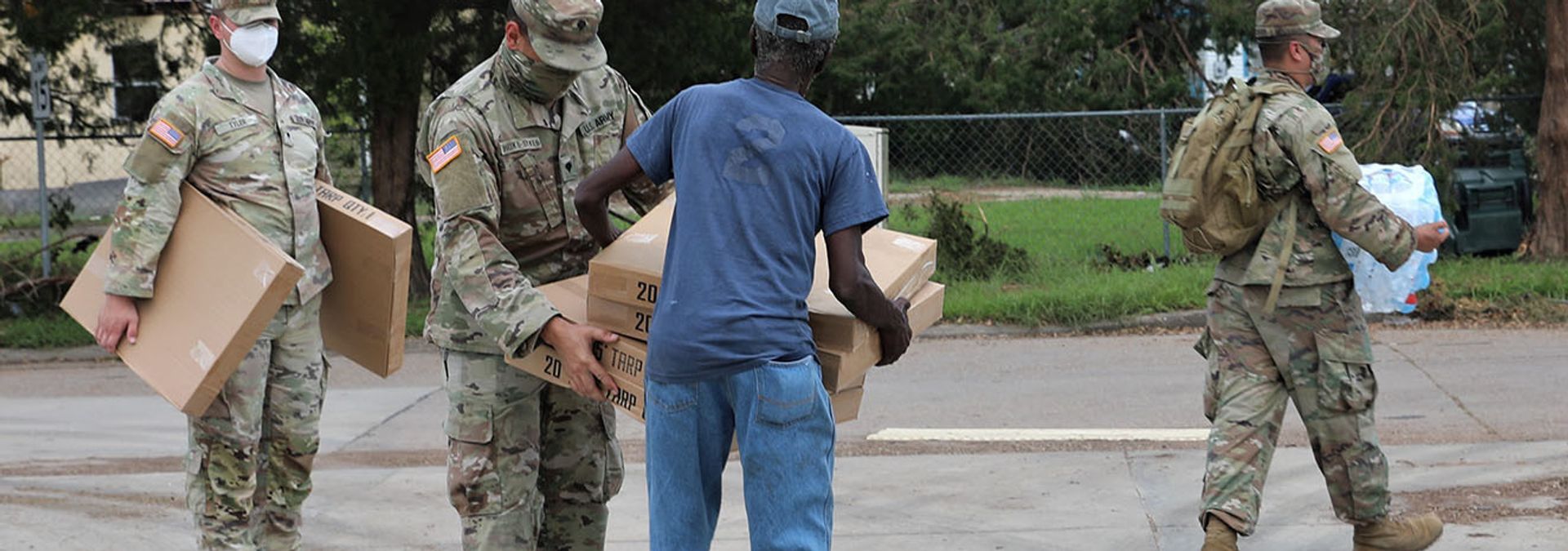
The Gulf Coast is worth the fight
We have to make sure communities can respond and recover more quickly, and more fully, after storms like Hurricane Ida. Photo: Lousiana National Guard.
I've always looked forward to my birthday. As August 28 neared, I counted down the days. Until I moved away for college at 17, my mother decorated our kitchen with streamers and balloons, and on the table would be gifts, my favorite local dishes and a cookie cake. We’d gather around and celebrate … me!
In August 2005, I’d made plans to travel home from Atlanta for my birthday. But the weather forecast didn’t look good, so I canceled my trip and enjoyed shrimp etouffee, French bread and alligator bites with a group of friends. Leaving the restaurant, though, I glanced up to see images of my home on every TV screen. I called every one of my relatives to check on them. It was August 28, my birthday, the day before Hurricane Katrina made landfall.
What followed was immense: Levees started to break down, which led to disastrous flooding. There was more than $100 billion in damages, with communities and families, including many of my relatives, displaced. More than 1,800 lives were lost. That devastation took a toll on me, causing major PTSD. Yes, I still look forward to celebrating, but as every August 28 nears, now, a small voice in the back of my head says, “God, please don’t let another horrendous hurricane be anywhere in the vicinity of my family.”
But that’s what happened with Ida, which made landfall that day, 16 years after Katrina. Ferocious, 100-mile-per-hour winds, torrential rain and massive storm surges knocked out power to New Orleans and other communities. The storm formed and intensified so rapidly that people had little time to prepare and protect themselves. One cousin told me she was going to leave New Orleans at 5 a.m., thinking that would give her enough time to get to Houston and get settled. It’s normally a six-hour drive. I called her later that day at about 4:30 p.m., and she was stuck between Lake Charles and Beaumont, with two and a half hours still to go. The evacuating traffic was that bad.
Five days later, she expressed that families, like herself, were running out of money to continue their hotel stays, wanting to go home but concerned about the flooding, knowing there were still thousands without electricity.
Ida is what we can expect to become the norm if we fail to act on climate change. The hot, moist air thick with clouds, mixed with the unusually warm waters of the Gulf, were a potent combination that supercharged the storm. Climate change is a threat to everyone, but the effects are not felt equally.
We know this all too well through the work that we do at Moms Clean Air Force. It is the reason why we continually fight for justice in every breath, as communities of color, and low-income communities, face the greatest risk, hit “first and worst” by climate change and suffer real environmental injustices. These are the communities living on the frontlines, next to power plants, failed levees and other polluters.
After Katrina, some of my friends said, “I don’t understand. Why don’t people just pick up and leave?” I had to inform them that many families don’t leave because they want to stay or think they’ll be fine, but because they can’t afford to and have no place to go. Some Black and brown communities don't have the same resources. Still, you hear the same question now about the community where the Formosa Plastic Group wants to spend billions of dollars to build 14 new plants for one of the world’s largest petrochemical complexes and pollute even more in St. James Parish, just upriver from New Orleans in what we call Cancer Alley: “Why don’t people on the Gulf Coast just move?”
We know it might be safer to go somewhere else. It might be safer even to leave St. James, or New Orleans, or Houston, period. But some people live on streets that are named after their families. If you grew up there, that's what you're used to. You’re used to family being near, used to the culture. Four generations can live together in one household. You don’t want to leave your safe space. It’s yours.
So ask yourself: Why don’t you just leave?
Because you don’t want to. Because it’s your home.
Because it’s worth fighting for.
My Louisiana folks are a bunch of resilient people. They just make it work. What I’m hearing now from many as the hurricane season wears on are more questions: What do we do this month? Do we patch up the house, in hopes that the next hurricane won’t batter us as it’s being worked on? As President Biden talks about making a once-in-a-generation investment in our nation's infrastructure, it has to be an investment in the infrastructure communities actually need.
There's a difference between doing the hard work of real community engagement and simply saying we need environmental justice initiatives. They sound great, but did these initiatives come out of the engagement with communities?
I would like a new set of memories related to my birthday month, like so many other families in my home state, who have experienced these traumatic events. The only way that will happen will be safe, and impactful, investments made for people. We can’t only repair bridges and roads. We have to prepare our power, water and communications systems to get ready for the extreme weather events. We have to make sure communities can respond and recover more quickly, and more fully, afterward.
The Gulf Coast is worth the fight. Together, we can work toward a future where everyone has what they need to protect their homes, families and culture for the generations that will come after them.
Dr. Calhoun is National Field Manager with Moms Clean Air Force.
STAY UP TO DATE
The quality of our newsletter is considered satisfactory and poses little or no risk.
SUBSCRIBE

